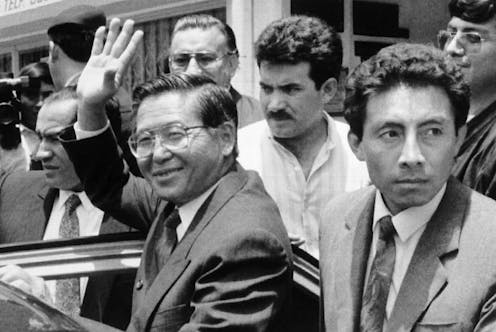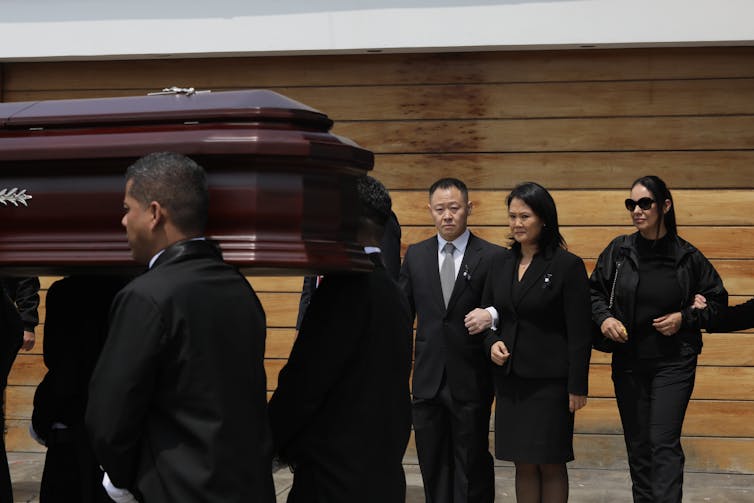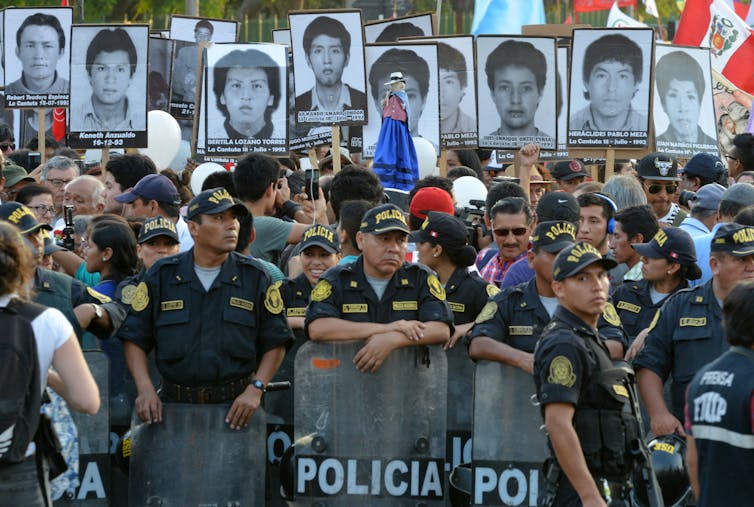Fujimori’s death won’t end pursuit of justice for Peruvian victims – or stop the strongman’s support
Years after being ousted during his third term in office, the former Peruvian strongman was sentenced to 25 years in prison for crimes he committed as president. He was later pardoned – twice.

The death of Alberto Fujimori, the deeply divisive former Peruvian president, comes amid a resurgence of interest in the former strongman – both from supporters and detractors.
And in some regards, the usual customs following the demise of a former leader are being observed.
Politicians, relatives and defenders of Fujimori have publicly expressed their condolences. Peru’s government has declared three days of national mourning during which the country’s Congress will be suspended. The flag is being flown at half-mast, and a wake will be held at the Ministry of Culture.
But others rejoiced at news of his passing; Fujimori was, after all a controversial figure in Peru, a country he led and then fled before being extradited back from Chile and serving time in prison for bribery and ordering the murder of 25 people.
As a scholar writing a book about human rights violations in Peru under Fujimori, I see Fujimori’s death from cancer at age 86 on Sept. 11, 2024, as a reason to reflect on where Peru is now. It is also an opportunity to express concern that any attempt to absolve the Fujimori legacy of its crimes may signal democratic backsliding.
Litigation is still underway
Fujimori served as president for a decade after first winning Peru’s 1990 election. Two more electoral victories followed. But even after being ousted from power by lawmakers in 2000, he remained a powerful presence in the country’s politics.
His death coincided with new legal investigations into human rights abuses, including allegations that his administration forced thousands of Indigenous Peruvian women to be sterilized and reportedly disguised this campaign as a family planning initiative.
The ongoing probe implicated both Fujimori and his former health ministers. A court case over the Fujimori administration’s forced sterilization campaign, Celia Edith Ramos v. Peru, is now pending at the Inter-American Court of Human Rights in Costa Rica.
The president of DEMUS, a women’s rights group based in Peru, said that despite Fujimori’s death, the organization “won’t give up” until it gets truth, justice and reparations for victims.
Revered to the end
Despite his many legal woes, and a 1992 “self-coup” that temporarily suspended the Peruvian constitution and dissolved the nation’s legislature, many Peruvians still revered him till the end. His daughter Keiko Fujimori had declared just two months ago that her ailing father planned to run for president again in 2026.
His death is likely to further ignite the resurgence of “Fujimorism,” a largely right-wing movement centered around the legacy of the former president and his family’s political party.

Just months before Fujimori succumbed to cancer, Peruvian lawmakers passed a law placing a statute of limitations on crimes against humanity, despite objections from the Inter-American Commission of Human Rights.
The law prohibits anyone accused of committing crimes against humanity and war crimes before July 1, 2002, from being prosecuted, sentenced or punished. By effectively granting amnesty to all historic human rights violators, the legislation blocks lawsuits tied to any domestic armed conflicts, including those dating back to Fujimori’s time in office.
This law, and now his death, have sparked concerns over the plight of victims and survivors of human rights abuses that occurred during his decade-long administration.
Legacy of human rights abuses
Fujimori came to power amid a major economic crisis marked by hyperinflation and the rise of left-wing guerrillas who threatened the country’s political, social and economic stability.
Peru’s armed conflict began in 1980, when the Marxist Shining Path guerrilla group announced its intention to wage war in rural and urban areas.
The next two decades were marked by bouts of authoritarian rule with significant military involvement during the presidencies of Belaúnde Terry, who was in office from 1980-1985; Alan García, from 1985-1990; and Fujimori’s administration from 1990-2000.
The conflict and resulting human rights violations – 69,000 Peruvians were killed or disappeared – involved the state, Shining Path guerrillas and civilians who were caught in the middle. The state was responsible for 37% of the deaths and disappearances, according to a subsequent Truth and Reconciliation Commission.
The most emblematic crimes took place during Fujimori’s first term in office, between 1990 and 1995. They included the massacre of civilians in Lima’s Barrios Altos neighborhood in 1991, the forced disappearance and murder of nine students and one professor from Lima’s La Cantuta University in 1992, and the kidnapping of journalist Gustavo Gorriti and businessman Samuel Dyer.
As a result of these incidents and other violations, Fujimori was tried and then convicted of crimes against humanity in 2009. He was sentenced to 25 years in prison.
Fujimori’s supporters called for him to be pardoned – and succeeded twice. Former President Pedro Pablo Kuczynski granted one pardon in 2017, and President Dina Boluarte granted the other in December 2023.
Both pardons sparked nationwide protests among Peruvians, many of whom believed that Fujimori should have remained behind bars for the rest of his life.
Another Fujimori runs for president
Research shows that when former leaders held responsible for human rights violations continue to wield power in politics, it is harder for subsequent governments of a country to adequately respect or uphold human rights.
Keiko Fujimori, Alberto’s daughter and head of the right-wing Fuerza Popular Party that promulgated the amnesty law, is already proving that finding correct.
She is the heir to Fujimorism, which could see a resurgence following her father’s death.
While she lost presidential bids in 2011, 2016 and 2021, it is looking increasingly likely that she will make a fourth attempt in 2026.
Can there be justice for his victims?
Alberto Fujimori’s death means that some of the court cases he faced, such as those of coercive sterilizations, will end. His death also means that the 57 million soles – about US$15 million – in reparations to the Peruvian government that a court ordered him to hand over will go unpaid. Peruvian law prohibits that the next of kin pay the deceased’s civil reparations with their own funds, as debt is not hereditary there.

However, his victims, their families and human rights advocates are looking at creative ways forward. It may even free them up to go after others implicated in the former strongman’s crimes.
On coercive sterilizations, Maria Ysbel Cedano from DEMUS remarked that this violation of reproductive rights not only involved Fujimori as the perpetrator of abuse but the complicity of others who served in his government and are still alive.
Other relatives of human rights victims see in Fujimori’s death new reasons to focus on their fight against actions by the current Peruvian government.
Fujimori may have his legacy rehabilitated by supporters after his death. But his passing could also serve to galvanize those demanding an end to what they consider to be impunity for the perpetrators of Peru’s human rights abuses.
Ñusta Carranza Ko does not work for, consult, own shares in or receive funding from any company or organization that would benefit from this article, and has disclosed no relevant affiliations beyond their academic appointment.
Read These Next
AI’s growing appetite for power is putting Pennsylvania’s aging electricity grid to the test
As AI data centers are added to Pennsylvania’s existing infrastructure, they bring the promise of…
Why US third parties perform best in the Northeast
Many Americans are unhappy with the two major parties but seldom support alternatives. New England is…
Abortion laws show that public policy doesn’t always line up with public opinion
Polls indicate majority support for abortion rights in most states, but laws differ greatly between…





